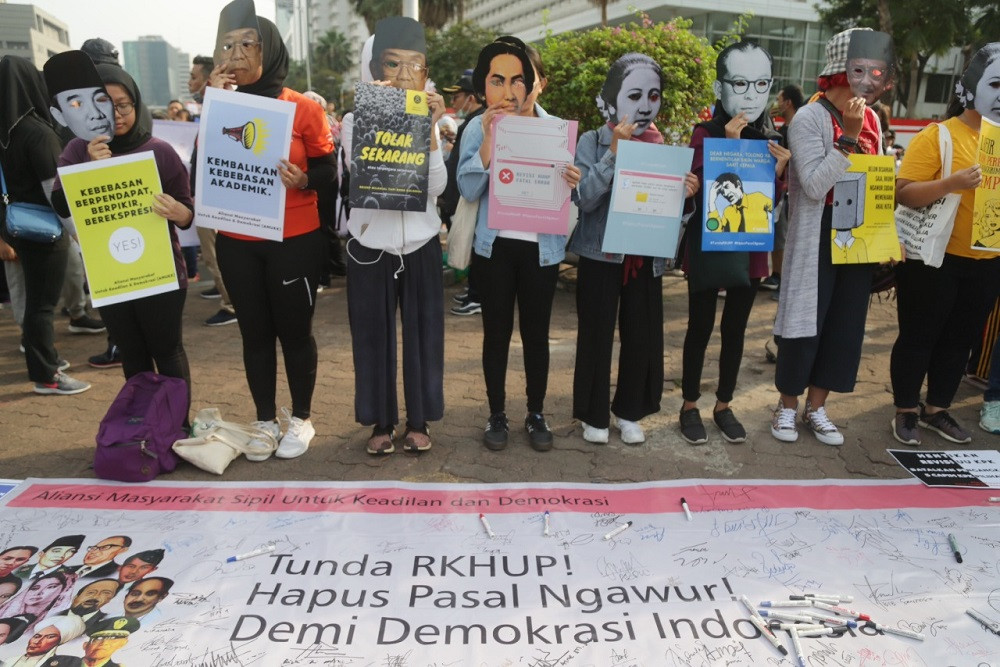Govt pushes ahead with KUHP revision
Deputy Law and Human Rights Minister Edward OS Hiariej said the House would expedite the deliberation of the Criminal Code draft and claimed that the bill’s passage was long overdue.
Change Size

D
espite widespread calls to pause deliberations on the revised Criminal Code so that public concerns can be addressed, the Law and Human Rights Ministry expects the legislation to be “expedited” for passage in the coming months.
Deputy Law and Human Rights Minister Edward OS Hiariej, a former law professor at Gadjah Mada University, said that although the draft revisions to the Criminal Code would be unlikely make it to a House of Representatives plenary session in July, a deal could be struck in August to pass the bill into law.
The deputy minister said the government was on “a historic mission” to decolonize the current Criminal Code, which is founded on Dutch colonial law.
"The next plenary session is just 10 days away, and the House will go into recess until Aug. 16, so it is unlikely that the revisions to the Criminal Code will be passed in early July," Edward said at a public discussion last week.
He added, however, that the government and the House would expedite the deliberation of the Criminal Code draft and claimed the bill’s passage was long overdue.
"People have asked why we suddenly want to pass this law. There's nothing sudden about the process. The proposal to update the Criminal Code began in 1958, and a draft revision was brought to the House in 1963," he said.
The deputy minister also defended the government’s decision not make the draft revision available to the public, saying it would be released once it had been accepted by the House for discussion.
Civil rights groups have accused the government of rushing the passage of the bill to skirt public oversight and have demanded that the government release the complete draft. Activists and scholars are currently relying on an out-of-date draft from 2019 for their work and engagement with the government.
In response to public outcry over the contents of the 2019 draft, the Law and Human Rights Ministry claims to have reformulated 14 problematic topics in the bill, less than the 24 topics that activists had demanded be reviewed.
One such provision would make insulting a sitting president punishable by imprisonment. Similar provisions were repealed by the Constitutional Court in 2006 on the grounds that they undermined the right to free speech.
Other provisions, activists say, encroach further on civil liberties and could roll back some of the country’s democratic gains over the past two decades. These include a regulation that makes it illegal to insult government agencies and one that requires government approval for street demonstrations.
Student and legal activists say such stipulations pose major threats to free speech.
"Under the current law, the police already have a penchant for arresting people for making controversial statements on social media [...]. Things could get worse in the future," said legal activist Muhammad Isnur of the Indonesian Legal Aid Institute (YLBHI) at the discussion.
Isnur said the revisions to the Criminal Code should incorporate existing protections for civil liberties instead of quashing them.
"What kind of democratization spirit do we want to protect? We have ratified a lot of human rights conventions over the past two decades, and the new draft should reflect this development,” he said.
Legal scholars and activists have also called for details on an expected blasphemy provision to be made public.
Legal scholar Zainal A. Bagir of Gadjah Mada University said there needed to be a clear definition of what constituted blasphemy in the new Criminal Code.
“If anything, the new draft should raise the threshold for what could be deemed an insult to religion,” Zainal said.
Responding to criticism of the bill and the opacity of the legislative process, one member of the government’s drafting team, Harkristuti Harkrisnowo, said it would be difficult to accommodate all public demands and proposals.
The best the government could do, she said, was seek “a middle ground for some disparate proposals”.
“For instance, on the issue of cohabitation, we have to listen to proposals from some groups in West Sumatra, who consider the issue to be [of public concern]. They asked why the police should have to wait for a complaint [before taking action],” she said.
Harkristuti said it would take years to complete the deliberation of the new Criminal Code if all the issues were discussed publicly.
“Do we want to have a referendum on every article in the draft? We need to find a compromise,” she said.









